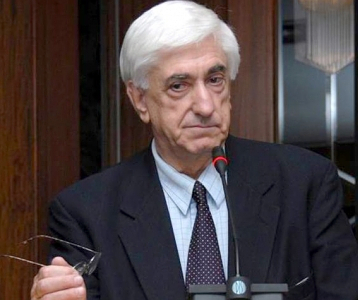
Alexandre Rondeli (Alika for most of his Georgian friends and colleagues) was a charming and talented man, a close friend, a consul, a strategic ally, from the category of “usual suspects”, and, at times, a political opponent. Most of the people who dealt with him called him a “Wise Man of the Caucasus,” at times because he had foresight, at times because he always had a dramatic tone, and was convinced that “all moves”, from conquering territory to world peace, reserved a central role for Caucasus and – first and foremost – Georgia. He was of course right.
Over the last few years, Alika and I shared less time together than our long friendship deserved. In truth, we did not share every view; we made different personal choices; we did not always share the same political objectives. But we did share the same values and principles to make Georgia a strong, capable, democratic state.
What we did share remained fundamentally unchanged. We shared a vision that belonged not only to our generation, but also to the generations of our ancestors: to build a country that was worth leaving behind and strong enough to remain standing. Alika’s deeds stay with us, reminding us that reality must be envisioned before it becomes reality; his dreams stay with us, to haunt us.
Alika was a close friend whom I did not meet frequently in person but with whom I was permanently in dialogue, as we debated, agreed and disagreed. He had an unbending spirit and never ceased to dream of what might happen next. Aware of his sickness, which he faced with a stiff upper lip, he kept speaking with optimism, with constant fascination for what lay ahead of us. The fire in his eyes was fading away, but he remained defiantly optimistic.
He loved Georgia, specifically his students, and he believed that the young, bright and strong generation that follows would be the brightest part of his legacy. It is.
He was also a man who loved football, one of Georgia’s pastimes, along with local politics, so we talked much of the game of football, specifically of its Georgian present-day version, if I may say that way. As with any topic he discussed the game with a particular mix of sarcasm and depth – in thinking and in voice – which underscored his assessments – all of his assessments – serious and trivial alike. His was a long-time fan of the football club Dinamo Tbilisi and his chant “Di-na-mo, Di-na-mo” at the end of any meeting or conversation, serious or insignificant, either with friends or foes, was a statement about who he was and what he was.
For our generation, that chant meant one thing when we were growing up and quite another after we had grown up: it was about Georgia, its current problems and its prospects for the future, and about how to make the outside world keep Georgia on its mind. I was privileged to have sung it with him. I urge Alika’s students and the entire young generation of Georgia’s best and brightest to keep chanting: “Go Dinamo!” That would be the best memory of Alika Rondeli.

